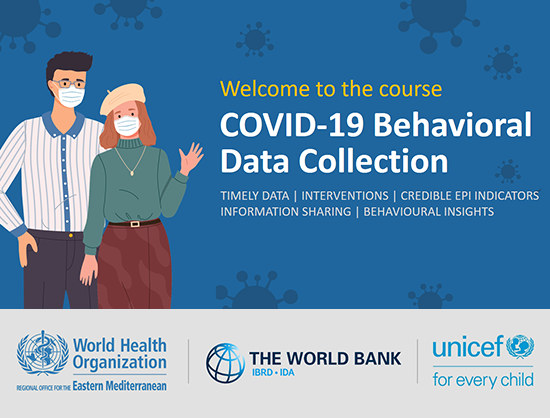
This course provides an overview (only) of key considerations to support country offices to work with partners to improve national data collection. The survey package described here is designed to collect social and behavioural data - perception, knowledge, practices, social and structural factors - to inform the uptake and roll-out of COVID-19 vaccines as well guide risk communication and community engagement (RCCE) planning and intervention to address community fatigue and complacency towards public health and social measures (PHSM).
Please note: These materials were launched on 26/04/2022.
Idioma: English
COVID-19
Información del curso
Course overview:
On 30 January 2020, the World Health Organization (WHO) declared the novel corona virus (COVID-19) outbreak a Public Health Emergency of International Concern. The virus continued to spread throughout the world and was finally declared a pandemic on 11 March 2020. Globally, there are more than 100+ million confirmed cases and over 2.2M deaths from COVID-19. The spread of the COVID-19 pandemic and its potential impacts on multiple aspects of the regional economy and livelihood create an urgent need for timely data and evidence to monitor the crisis and inform interventions and policy responses. WHO, UNICEF and the World Bank have jointly developed this package to support ongoing surveys to evaluate and inform the social, economic, and behavioural impact of COVID-19, including vaccines, in the WHO Eastern Mediterranean and UNICEF Middle East and North Africa regions.
Course duration: Approximately 3 hours.
Certificates: A Record of Achievement will be issued to participants who receive at least 80% on the final assessment. You have an unlimited number of attempts to meet the threshold. Participants who receive a Record of Achievement can also download an Open Badge for this course. Click here to learn how.
Learning objectives:
By the end of this course, you should be able to:
- Describe the survey tool and best practices for use.
- Illustrate your skills and knowledge on the interpretation of data
- Evaluate data strategy and identify potential areas for further analysis.
- Identify tools and methods that can be used for effective dissemination of data.
- Explain the key components of budgeting and RFP processes.
- Describe the key considerations for setting up a National Survey.
Contenido del curso
Module 1: Introduction to survey and key objectives:
By the end of this module, you should be able to: understand the key considerations for setting up a National Survey.Module 2: Methodology and survey best practices:
By the end of this module, you should be able to: understand the survey tool and best practices for use.Module 3: Data strategy:
By the end of this module, you should be able to: enhance your skills and knowledge on the interpretation of data.Module 4: Data analysis:
By the end of this module, you should be able to: understand data strategy and identify potential areas for further analysis.Module 5: Data reporting:
By the end of this module, you should be able to: broaden awareness of tools and methods that can be used for effective dissemination of data.Module 6: Roles and responsibilities:
By the end of this module, you should be able to: describe the roles and responsibilities of different stakeholders in data strategy.Module 7: Budget and costing guidelines:
By the end of this module, you should be able to: know the key components of budgeting and RFP processes.Module 8: Summary:
By the end of this module, you should be able to: summarize the topics learnt in the course.Final Assessment
Matricularme en este curso
Requisitos para el certificado
- Obtenga un certificado de estudios al obtener más del 80% del número máximo de puntos de todos los trabajos evaluados.
- Obtenga una insignia digitale abierta al completar el curso.